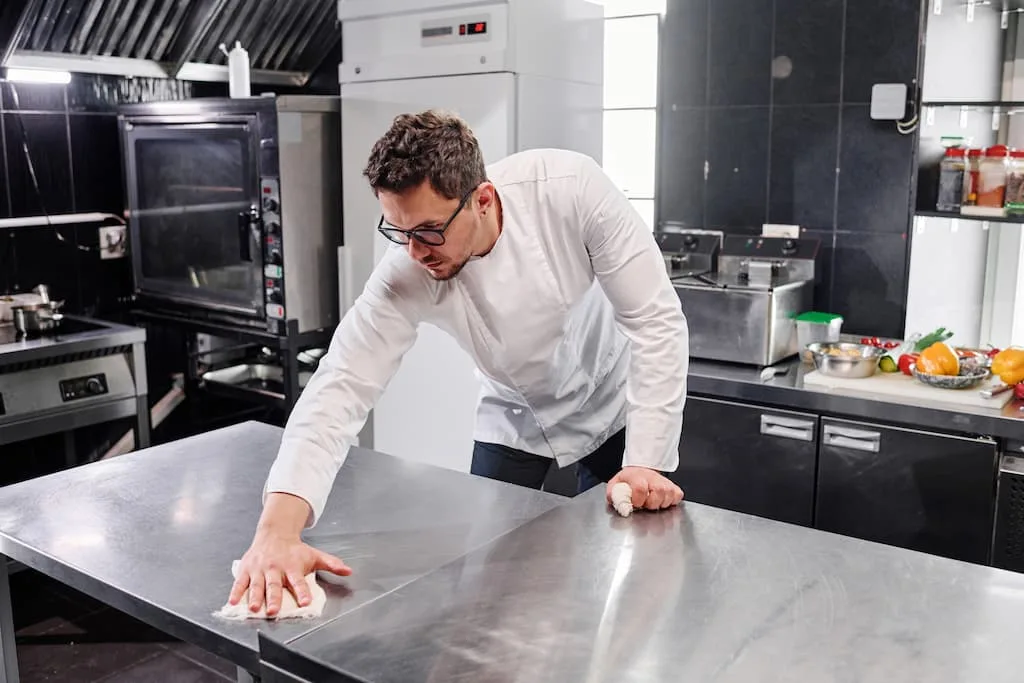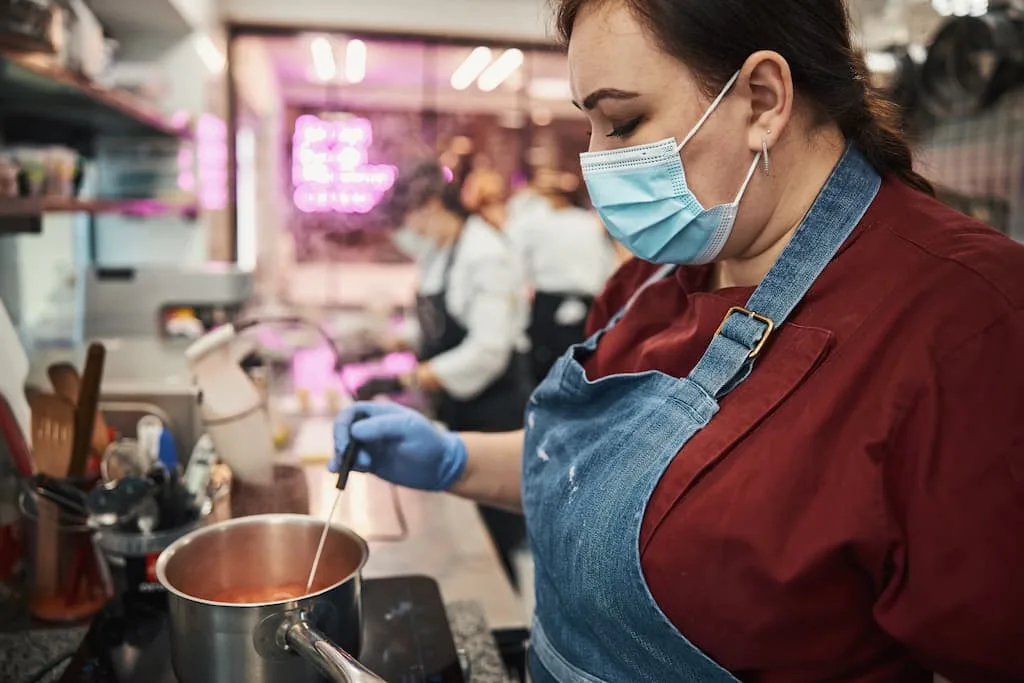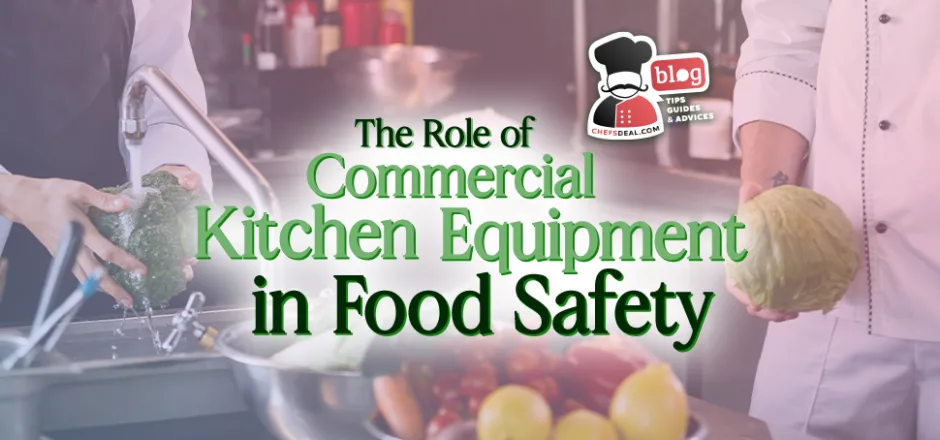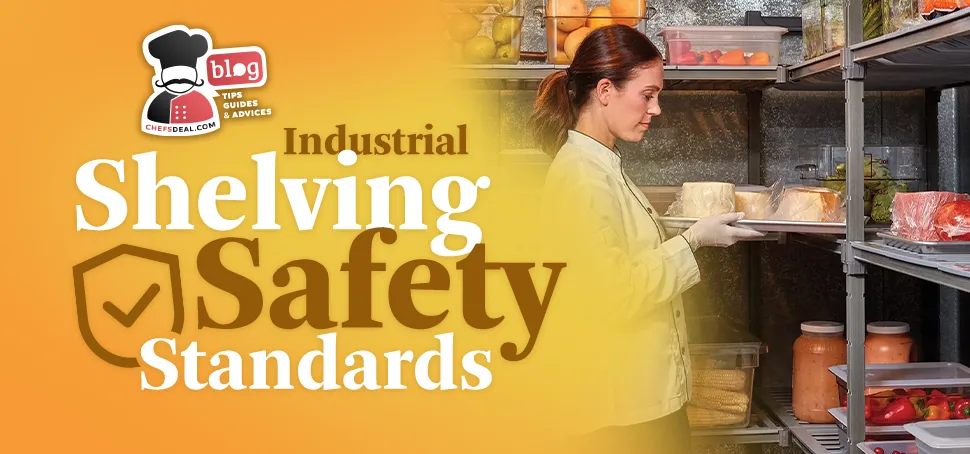Commercial kitchen equipment is critical in ensuring food safety in the foodservice industry. It encompasses various vital tools and appliances for preparing, storing, and handling food. While creating a comfortable and inviting atmosphere for customers in the front of the house is important, the back of the house, where food preparation takes place, must prioritize organization, maintenance, and adherence to regulations to uphold high hygiene standards. Every piece of equipment in a commercial kitchen contributes to overall food safety practices, addressing crucial aspects such as preventing cross-contamination, maintaining proper temperatures, and facilitating efficient cleaning and sanitization processes.
The selection of appropriate equipment is the first step towards ensuring food safety. Food prep stations, cooking appliances, refrigeration units, dishwashers, and more are designed with specific features and functionalities to meet these requirements. By investing in reliable equipment and regularly maintaining it, foodservice establishments can establish and maintain the highest food safety standards. This not only protects the health of their customers but also safeguards their reputation.
Training staff members on properly using and maintaining commercial kitchen equipment is equally important. They need to be familiar with the equipment’s functionalities and understand their critical role in maintaining food safety. Additionally, optimizing the working conditions in the kitchen, such as ensuring proper ventilation and adequate space for efficient workflow, contributes to a safer and more hygienic environment.
Understanding the Link Between Kitchen Equipment and Food Safety
In this article, we will delve deeper into the significance of commercial kitchen equipment in ensuring food safety. We will explore various types of equipment and their specific contributions to maintaining a safe and hygienic environment. Furthermore, we will discuss key considerations for selecting and maintaining equipment to effectively uphold food safety standards. By the end, you will understand how the choice of commercial kitchen equipment significantly impacts the overall safety and quality of the food served. So, keep reading to discover how to create a secure and healthy environment through equipment choices.
Food-Safe Equipment Selection
Even though commercial kitchen equipment resembles the regular residential models in appearance and function, they greatly differ due to their special designs to withstand rigorous use in commercial areas and address commercial kitchens’ specific requirements and needs. Hence, you must carefully select the tools and appliances that you will use in your kitchen.
1. Easy to Clean Surfaces
Food prep, storage, and cooking equipment occupy the most space in the back of the house, and they are continuously subject to food contact. Therefore, the role of commercial kitchen equipment in food safety is the highest, which requires efficient and constant cleaning. Most commercial kitchen equipment features smooth surfaces to facilitate cleaning, and many boast NSF certification that denotes continual testing and inspection for food-contact safety.
In addition to keeping the surfaces clean and hygienic to hinder bacterial growth and food debris pile-up, the role of commercial kitchen equipment in food safety is also apparent in preventing cross-contamination. For instance, cutting boards and chef knives are offered in various colors to enable you to use different tools for vegetables, meats, or pastry products.

2. Food Storage
Food ingredients are time or temperature-sensitive products, and therefore, they need to be stored systematically to ensure a smooth inventory operation and to be preserved in refrigerated cabinets to maintain their safety and freshness.
Shelving
Commercial shelves and racks are ideal for making the most out of your available space by vertically utilizing the walls and floor space to store the food ingredients in stock. They can help you keep records of food arrival, and you can easily apply the First in, First Out rule.
Commercial Refrigeration
The role of commercial kitchen equipment in food safety is primarily in food refrigeration. Food and Drug Administration concludes that foods must be stored under 40°F for varying periods depending on the food type to prevent spoiling. Therefore, perishables, greens, and meats must be preserved in suitable refrigeration equipment for later use or service. Although some businesses prefer to employ residential units for their limited volume needs, commercial refrigerators and freezers are the correct option since they are designed for precise temperature controls, consistent refrigeration with powerful compressors, and smooth surfaces for easier cleaning.
3. Food Preparation and Cooking
Food preparation and cooking require efficiency and reliability to ensure the highest customer satisfaction with speedy service, consistent taste, and texture. Thus, you are advised to consider the role of commercial kitchen equipment in food safety and equip your establishment with the right and proper commercial food processing to prepare the foods quickly without spoiling the ingredients and food products while ensuring the best result with the commercial cooking equipment.

Quality Equipment Ensures Precision and Consistency
Commercial cooking equipment is designed to present the best cooking results to allow you to achieve the very right texture and taste in your mind. They are configured to better monitor, retain and even adjust the temperature during cooking with precise control over the temperature. Furthermore, most of these units come with pre-recorded settings or enable you to record new recipes with new settings to ensure consistency for every use.
Commercial cooking equipment such as convection and combi ovens, deep fryers, or kitchen ranges are durably constructed units that have shorter heating times, powerful burners and heaters, and advanced condition and timing controls. Hence, if you have a safety concern in your facility because of the role of commercial kitchen equipment in food safety, then you should acquire each of these units to cook your recipes quickly to prevent bacterial growth; to prevent burns due to overcooking and cross-contamination because of the food debris.
4. Warewashing and Dishwashing
Sanitation in a foodservice business is crucial for protecting public health and is subject to strict regulations by the FDA. Commercial dishwashers have prime importance when considering the role of commercial kitchen equipment in food safety. They are available as low temp units, which sanitize with chemicals, or high temp models that rely on too-hot water to kill all the bacteria and germs to prevent cross-contamination. Furthermore, commercial dishwashers, glass washers, and pot washers can handle hundreds of pieces per hour to catch up with the high-traffic restaurants, dining halls, and bars so that every plate, glass, or pot is clean and sanitized for new ingredients, meals or desserts.
Equipment Maintenance for Food Safety
Commercial kitchen equipment needs to work and perform properly all the time not to cause any shortage or interruption that will compromise food safety precautions and regulations.
Maintain your equipment regularly.
Despite the sturdy and durable construction of commercial kitchen equipment for commercial settings, their components and parts will wear out in time because of constant use. Thus, they are required to be maintained regularly to check for any broken or worn-out details that need replacement or repair to ensure well performance. Additionally, you can also keep stocks of the most needed spare parts, such as gaskets for refrigerators, blades for slicers, or attachments for mixers, for your crucial equipment to minimize the repair time.
Ensure Cleanliness and Hygiene
In addition to cleaning the floor and working surfaces, it is vital to regularly clean and sanitize the commercial kitchen equipment to prevent bacteria, germs, and other toxic elements that cause food spoiling and waste.
For instance, commercial dishwashing cause liming and scaling in time with the accumulating food remnants and crumbs. Therefore, you need to delime dishwashers with suitable chemicals, or you can opt to get an advanced dishwasher with a deliming function. The role of commercial kitchen equipment in food safety is also a decisive factor in the cooking quality, and therefore, you should frequently clean the ovens to remove the food, oil, and fat remnants. Some commercial ovens also offer auto-cleaning technology to minimize the workload for your staff.
Temperature Control in Commercial Kitchens
The role of commercial kitchen equipment in food safety is not limited to food storage, preparation, and cooking, it also refers to the creation and maintenance of clean and hygienic air quality. Therefore, you should install suitable ventilation systems to remove the grease, odor, and heated air from the kitchen.
In addition, you should regularly check the temperatures inside the front and back of the house to sustain the comfort of your guests while providing proper air conditioning to improve the atmosphere for better working conditions and higher food safety in the back of the house.
Staff Training and Education on Equipment Usage
Despite the important role of commercial kitchen equipment in food safety, you should always keep in mind that flawless food prep operation, efficient service line, and constant food safety are directly correlated with your staff’s quality and experience. Your staff continuously contact with food products and operate all the equipment. Hence, you should regularly and appropriately train your personnel to frequently wash their hands and operate ovens, food processors, mixers, and all other commercial kitchen equipment as required.
Conclusion
Investing in high-quality commercial kitchen equipment is essential for ensuring food safety and maintaining the highest standards in the foodservice industry. From food preparation and cooking to storage and dishwashing, every piece of equipment plays a critical role in upholding hygiene standards, preventing cross-contamination, and promoting efficient cleaning and sanitization processes. By carefully selecting the right equipment, adhering to regular maintenance schedules, and providing proper staff training, foodservice establishments can create a safe and hygienic environment for their customers.
In conclusion, the role of commercial kitchen equipment in food safety cannot be overstated. It contributes to the overall cleanliness and hygiene of a commercial kitchen and impacts the quality and safety of the food served. With proper equipment selection, regular maintenance, and staff education, foodservice businesses can ensure the safety and well-being of their customers, protect their reputation, and comply with food safety regulations. By recognizing the importance of commercial kitchen equipment in food safety and prioritizing its proper usage and maintenance, establishments can create a thriving foodservice operation. So, invest in commercial kitchen equipment, implement stringent safety protocols, and provide continuous training to your staff to ensure a safe and enjoyable dining experience.






